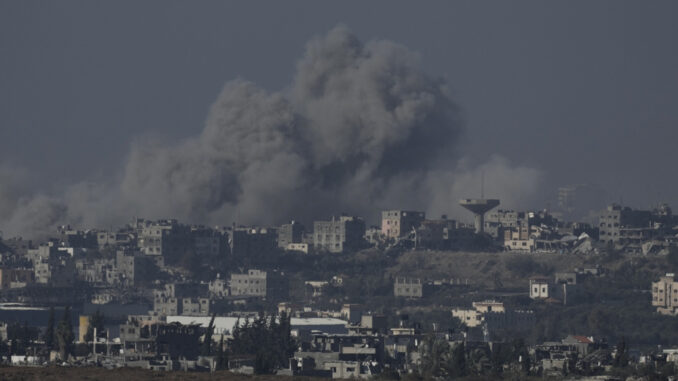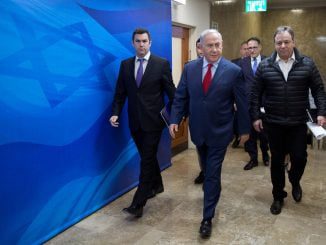
RAFAH, Gaza Strip — Israeli forces carried out strikes across Gaza on Tuesday as the military pressed ahead with an offensive that officials say could go on for weeks or months, even while global calls for a cease-fire leave Israel and its main ally, the United States, increasingly isolated.
The war ignited by Hamas’ Oct. 7 terrorist attack into southern Israel has already brought unprecedented death and destruction to the coastal enclave, with much of northern Gaza obliterated.
Strikes overnight and into Tuesday in southern Gaza — in areas where civilians have been told to seek shelter — killed dozens, according to hospital records.
Israel launched the campaign after Hamas and other militants streamed into the south on Oct. 7, killing some 1,200 people and taking about 240 others hostage, of whom about half remain in captivity. At least 105 Israeli soldiers have died in the Gaza ground offensive, the army says.
Israel’s blockade of the territory — and intense airstrikes and ground fighting that have made aid nearly impossible to distribute — have led to severe shortages of food, water and other basic goods.
Israel blames civilian casualties on Hamas, saying it positions fighters, tunnels and rocket launchers in dense urban areas, using civilians as human shields.
The U.N. secretary-general and Arab states have rallied much of the international community behind calls for an immediate cease-fire. But the U.S. vetoed those efforts at the U.N. Security Council last week as it rushed tank munitions to Israel to allow it to maintain the offensive.
Israel and the U.S. argue that any cease-fire that leaves Hamas in power, even over a small part of the devastated territory, would mean victory for the militant group, which has governed Gaza since 2007 and has pledged to destroy Israel.
While the U.S. has given wholehearted diplomatic and military support to Israel’s campaign, the two allies are wider apart over the timetable of the war and what comes afterward in Gaza if Hamas is defeated. The U.S. has also urged Israel to do more to prevent civilian casualties, but the toll in Gaza has continued to mount.
In a briefing with the AP on Monday, Israeli Defense Minister Yoav Gallant signaled that the current phase of heavy ground fighting and airstrikes could stretch on for weeks and that further military activity could continue for months.
White House national security adviser Jake Sullivan said he will speak with Prime Minister Benjamin Netanyahu about timetables for ending major combat in Gaza when he visits Israel later this week.
Speaking at a forum hosted by the Wall Street Journal, Sullivan said he would also speak to Netanyahu about his recent comments that the Israeli military would maintain an open-ended security control of Gaza after the war ends.
The Biden administration says it does not want to see Israel reoccupy Gaza. It has also called for a return of the internationally recognized Palestinian Authority to Gaza and the resumption of peace talks aimed at establishing a Palestinian state alongside Israel.
Netanyahu on Tuesday acknowledged “there is disagreement about ‘the day after Hamas’.” He ruled out a return of Palestinian Authority rule, saying “I will not allow Israel to repeat the mistake of Oslo,” referring to the peace process in the 1990s that created the authority in the West Bank and Gaza and was intended to reach a two-state solution.
Some experts consider Israel’s aim to crush Hamas to be unrealistic, pointing to Hamas’ deep base of support among many Palestinians in Gaza and the occupied West Bank, who see it as resisting Israel’s half-century of military rule.
Even just destroying Hamas’ military capability “will be a tall order without decimating what remains of Gaza,” said the International Crisis Group, a think tank, in a report over the weekend that also called for an immediate cease-fire.
Israeli officials have said some 7,000 Hamas militants — roughly one-quarter of the group’s estimated fighting force — have been killed and that 500 militants have been detained in Gaza over the past month. Hamas says it still has thousands of reserve fighters.
Lebanon’s Hezbollah, meanwhile, has repeatedly traded fire with Israel, and other Iran-backed groups across the region have attacked U.S. targets, threatening to widen the conflict. Iran-backed Houthi rebels in Yemen, who have targeted Israeli shipping, attacked a tanker in the Red Sea with no clear ties to the country overnight.



